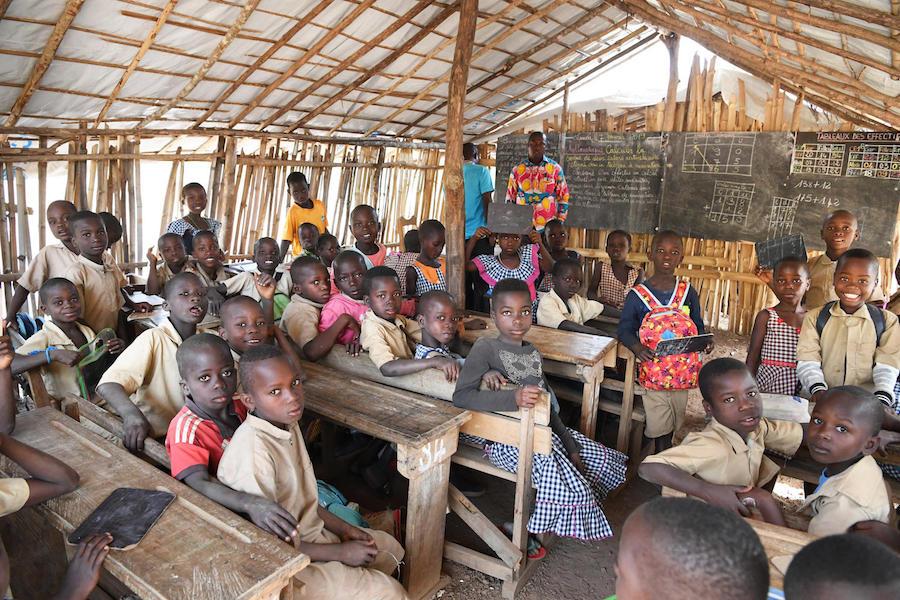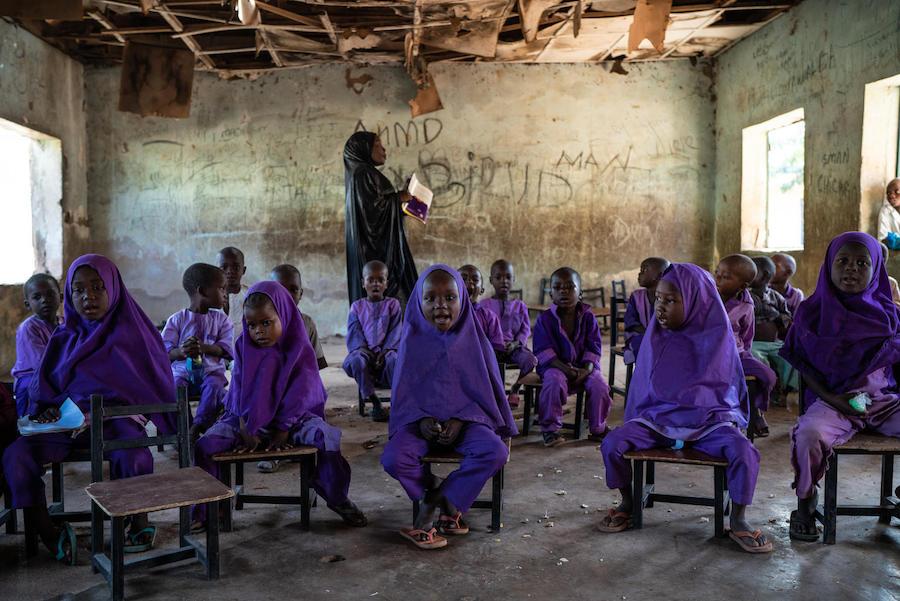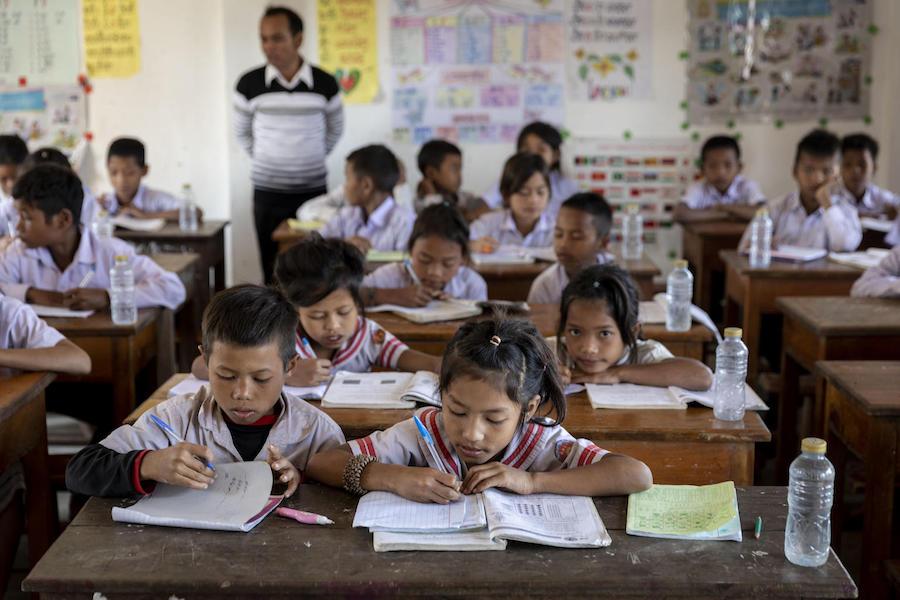
In Photos, 10 Classrooms From Around the World
Every week, children all across the globe pack up their book bags and head off to school. In the classroom, they develop academic and social skills they can use into adulthood and friendships that can last a lifetime.
Schools look vastly different around the globe, but they all offer children the tools they need to reach their full potential. In the midst of disaster, war and poverty, schools can be a safe haven, a place where dreams begin. An education can mean a ladder out of poverty and a path to a promising future. That's why UNICEF works in 155 countries to scale up access to quality education for the world's most marginalized children.

CÔTE D'IVOIRE Students in Sanguine, a village in western Côte d’Ivoire, attend school in a building that was built hastily by parents from bamboo and plastic tarps. The roof leaks and there's dust everywhere. This year, UNICEF Côte d'Ivoire will build 15 classrooms out of recycled plastic bricks, thanks to a joint venture with Conceptos Plásticos, a Colombian social business that transforms plastic waste into construction materials. © UNICEF/UN0274155/Dejongh

NIGERIA Young students recite a lesson at Miya Central Primary School, Bauchi State, Nigeria. One in 5 of the world's out-of-school children is in Nigeria. Even though primary education is officially free and compulsory, 10.5 million primary school-aged children between the ages of 5 and 14 are currently out of school. UNICEF Nigeria's 2018-19 "Every Child in School" campaign asks all Nigerians, especially the young people, to call on the government to invest more in education and make it a priority, so the next generation will have a better chance to thrive. © UNICEF/UN0269830/Knowles-Coursin

MALI Seated three to a desk, students raise their hands in class at a primary school in Nianabougou in the Sikasso region of Mali. "I dream of studying to be a doctor," says 12-year-old Fatoumata (front row, far right). "I want to serve my community and my parents in our village." More than 1 million children — nearly one-third — of primary school age in Mali are out of school. UNICEF and partners have trained more than 3,800 children and young people nationwide to become Back-to-School Child Ambassadors who go door-to-door in their communities, speaking with parents about the importance of sending their children to school. © UNICEF/UN0273467/Dicko

LAOS Twenty students, half of them girls, study Lao language in the pre-primary class of Pa Xia Primary School, Saravan province, Laos. Pa Xia is a small village with only 475 inhabitants. There are 86 students in the school, and four teachers. © UNICEF/UN0268434/Brown

SYRIA There are 1,400 students in the Saif Al-Dawleh School for Girls in Douma, East Ghouta, Syria. Saif Al-Dawleh is one of seven schools in Douma supported by UNICEF. After a seven-year siege, out of the city's 34 schools, 14 have been completely destroyed or heavily damaged. "In Douma, families are living — and raising children — amidst the rubble, struggling for water, food and warmth in the winter," said UNICEF Executive Director Henrietta Fore. "There are 20 schools, and all are overcrowded and in need of training for young teachers, books, school supplies, doors, windows and electricity." © UNICEF/UN0264228/Sanadiki

SOUTH SUDAN A child recites the English alphabet to a group of his 3- and 4-year-old peers in one of the classrooms of the picturesque Rock City School in Juba, South Sudan. After four long years of conflict, many of these children have been displaced and have witnessed the horrors of war. UNICEF's Education in Emergencies program provides temporary learning spaces where children are taught the basics by UNICEF-trained teachers. © UNICEF/UN0263293/Rich

YEMEN At the Ibn Zaidoon School in Aden, Yemen, girls attend class with UNICEF Regional Director for Middle East and North Africa Geert Cappelaere (adult on left) and UNICEF Representative in Yemen Merixell Relano (adult on right). "More than 2 million children in Yemen are out of school," said Cappelaere. "Those who are in school often have to settle for poor quality education in overcrowded classrooms." In 2019, UNICEF will help 693,000 children in Yemen continue their education. © UNICEF/UN0262496/Abdulhaleem

MONGOLIA Neatly ordered shelves line the brightly painted classrooms at General Education School #3 in Altai, Gobi-Altai province, Mongolia. With UNICEF support, teachers received special education training and improved the school's curriculum, incorporating lesson plans and learning materials for children with special needs. © UNICEF/UN0255435/Pasquall

ETHIOPIA There are 65 students enrolled in the Accelerated School Readiness program at Simbile Primary School in Ethiopia's Afar region. Ethiopia has made remarkable progress in education: Primary school enrollment nationwide tripled between 2000 and 2016. The number of girls in primary school rose from 51.8 percent in 2004 to 95.5 percent in 2017. © UNICEF/UN0251913/Tadesse
Global poverty could be cut in half if all adults completed high school. Education is a human right, a public good and a public responsibility. UNICEF calls on all governments and partners to make universal quality education a leading priority. Our future depends on it.
Top photo: Enthusiastic young students call out the answers in an Islamic school in Biankouma, a village in western Côte d'Ivoire. © UNICEF/UN0274531/Dejongh
HOW TO HELP
There are many ways to make a difference
War, famine, poverty, natural disasters — threats to the world's children keep coming. But UNICEF won't stop working to keep children healthy and safe.
UNICEF works in over 190 countries and territories — more places than any other children's organization. UNICEF has the world's largest humanitarian warehouse and, when disaster strikes, can get supplies almost anywhere within 72 hours. Constantly innovating, always advocating for a better world for children, UNICEF works to ensure that every child can grow up healthy, educated, protected and respected.
Would you like to help give all children the opportunity to reach their full potential? There are many ways to get involved.



